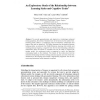Free Online Productivity Tools
i2Speak
i2Symbol
i2OCR
iTex2Img
iWeb2Print
iWeb2Shot
i2Type
iPdf2Split
iPdf2Merge
i2Bopomofo
i2Arabic
i2Style
i2Image
i2PDF
iLatex2Rtf
Sci2ools
105
click to vote
ECTEL
2006
Springer
2006
Springer
An Exploratory Study of the Relationship Between Learning Styles and Cognitive Traits
To provide personalization and adaptivity in technology enhanced learning systems, the needs of learners have to be known by the system first. Detecting these needs is a challenging task and therefore, mechanisms that support this task are beneficial. This paper discusses the relationship between learning styles, in particular the Felder-Silverman learning style model, and working memory capacity, a cognitive trait. Due to this relationship, additional information about the learner is available and can be used to improve the student model. An exploratory study is presented to verify the identified relationship based on the literature. The results of the study show that the identified relationship between working memory capacity and two of the four dimensions of the learning style model is significantly supported. For the two remaining dimensions further research is required.
| Added | 22 Aug 2010 |
| Updated | 22 Aug 2010 |
| Type | Conference |
| Year | 2006 |
| Where | ECTEL |
| Authors | Sabine Graf, Taiyu Lin, Lynn Jeffrey, Kinshuk |
Comments (0)

